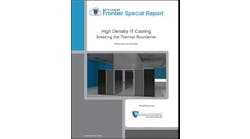How Educational Opportunities for Employment Scale with Diversity in Today's Data Center Industry
The race to build out the world’s digital infrastructure is moving faster than ever as enterprises continue to morph their IT infrastructure footprints to keep pace with the growth of cloud computing, artificial intelligence (AI) and other data-intensive applications and services – and for good reason.
All innovation today seems predicated on the availability of digital services and applications, and data centers, as the engine of digital services, are becoming one of the dominant pillars of the modern economy. These realities are causing workforce issues for the data center industry that are exacerbated by the lack of women looking for careers in this industry.
In response, efforts such as the Infrastructure Masons (iMasons) Digital Infrastructure Senior Capstone Project and other educational initiatives, the Nomad Futurist Foundation’s Powering Potential program, and global electronic design automation and IP company Cadence Design Systems' Diversity in Technology Scholarship and Women in Tech (WiT) initiatives have been launched to promote education and diversity within the "built world of digital."
Addressing the Talent Shortage in Data Centers
The data center industry is facing a human capital crunch, as workers who’ve been at the top of the game for decades are now getting ready to retire, and no real mechanism exists to convey institutional knowledge to the next generation.
The sector suffers from a lack of general awareness of careers in data centers, a lack of education about relevant technologies in schools, and a notable lack of women in technology fields looking to work in the subset that is data centers.
To work on remedying the situation, iMasons and Nomad Futurist Foundation are jointly developing educational programs directed at wide-ranging audiences, from grade-school kids to adults facing unemployment or the need or desire to change careers.
The goal is to create educational curriculum around data centers that can be used by traditionally non-data center related industries.
Talking about Nomad Futurist, Santiago Suinaga, Chief Executive Officer at iMasons, said:
“Their team has created a groundswell of support through their awareness building initiatives, developed meaningful connections in local educational communities, and engaged with thousands of young students. By joining forces, we can contribute together and create synergies, increasing awareness of the digital infrastructure industry and closing the talent gap through education and development of the next generation of skilled professionals for our industry."
This key partnership allows iMasons to expand its already-robust global network and adaptive influence, which has already launched a range of scholarship, resource group and chapter programs for education and inclusion.
Nabeel Mahmood, Co-Founder and Managing Director of Nomad Futurist, sees the collaboration as an agent of change, and that's not all:
"It is also a powerful example of industry leaders coming together, unifying the sector and building the type of connective tissue, between those within and outside the industry, between one generation and the next, that is needed to take the industry forward and develop the next generation of digital professionals.”
The Open Compute Project Foundation is also partnering with the Nomad Futurist Foundation to add their expertise toward addressing the human capital deficit in the industry.
According to Dirk Van Slyke, VP, Chief Marketing Officer of OCP:
“The OCP Foundation believes that the future talent needs of our community are critical to their success, which is why we are pleased to work with the Nomad Futurist Foundation to help bridge the gap of future talent for the next generation to come into the industry."
That characterization is directly on point for Nomad Futurist's educational outreach efforts that also include iMasons.
Raising Awareness
Lack of awareness of educational resources is most likely the biggest single-entry barrier to new members of the data center workforce. Many people don’t know the technologies that data centers help to modernize, and don’t think about the career opportunities that could come from that.
To alleviate this challenge, iMasons, OCP, and Nomad Futurist are working together to help get digital infrastructure education into schools. By bringing digital infrastructure education into the school curriculum, the goal is to create new pathways for students to get into the industry.
Cooperating with schools and communities allows these organizations to reach out to a large and diverse group of people. The educational work covers everything from early years’ schooling to advanced learning programs for degree-holders to be trained and nurtured as the industry’s future leaders, all with the ultimate goal of demystifying the data center industry for a new generation.
Tapping into Nomad Futurist’s community outreach and focus on students, these programs not only lay the foundation for the next generation of digital infrastructure innovators, but also strengthen communities around the world by providing the people needed to bring technology industries into those communities.
The Importance of Diversity in Data Centers
The data center industry recognizes that it does have a diversity problem - which, historically, has been a STEM [science, technology, engineering, math] initiatives problem.
Statistics show that only 25 to 30% of the technology workforce are women, and that fewer than a fifth (18.7% in the United States) are business leaders, with very little representation visible in management. Meanwhile, in the US, the number of women in AI accounts for just over 20% of the workforce, and there is no clear growth path for many of thee careers.
Acknowledging this reality, some organizations have launched initiatives to boost female participation in the data center sector.
Cadence Design Systems’ Fem.AI program, for example, targets gender inequality in the tech sector generally and with a focus on AI. Philanthropic and product donations via the program support women-led ventures, university students, and nonprofits that promote girls and women in AI and other STEM fields.
Fem.AI focuses on what it calls "leakage points" in the tech pipeline – key areas where women drop out of tech education or careers or fail to advance, including the transition from post-secondary education to the workforce and the retention of women in STEM career tracks.
But the program also has a broader approach than many other diversity initiatives: Fem.AI offers funding, but also seeks to create partnerships and alliances between industry, academia and nonprofit organizations that can help to make systemic change possible, so that more women ultimately succeed in tech jobs, which should have the effect of increasing the percentage of women in data center focused career.
iMasons, for example, has started resource groups like iMWomen, which focus on the professional development of women in the digital infrastructure industry. The group offers networking events, mentorship, and resources such as data to help women navigate the challenges of the industry.
By offering this support, iMWomen is creating a more connected community of professionals who can foster each other’s careers, providing women with a real chance of building a sustainable data center career.
Building a More Inclusive Future for Data Centers
As the work of partnerships like iMasons and OCP with Nomad Futurist and Cadence Design's Fem.AI will show, these initiatives are just the beginning of filling the sector's workforce and educational gaps, and providing ways for the data center industry to increase diversity in its ranks.
These measures are just starting points. The data center industry will need to continue intentional efforts to invest in pre-college and higher-education training programs, outreach programs, and inclusion efforts.
Meanwhile, the industry is growing so rapidly that scooping up staff from competitors has limited viability in promoting true growth. So the demand is there for new, younger staff to fill the ranks.
By creating diverse educational pipelines to cultivate the next generation of technology workers in the workplace, the data center and digital infrastructure industries can stay well-equipped for technology innovation and ensure a more equitable professional environment.






